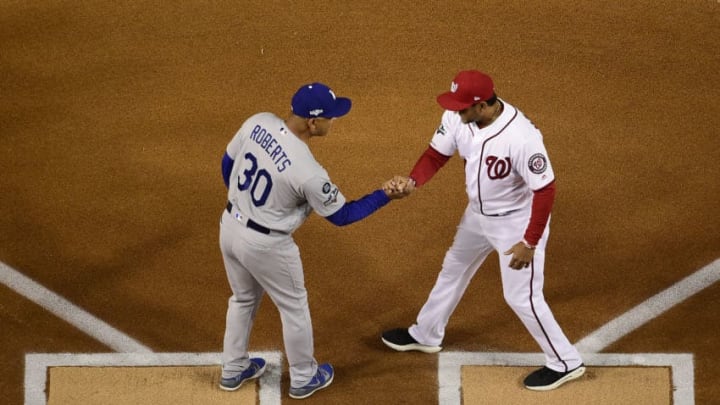Unique measures are sure to surface within a crammed 2020 season. Could MLB go to the extreme of ending extra-inning games in a tie?
With uncertainty surrounding the 2020 MLB season, all angles of game length and season length are being heavily evaluated. Once play begins – if play begins – is there a way to layout full 162-game schedules? Will doubleheaders be necessary? Will there be restrictions on extra-inning games to the outcome of a tie?
These are the questions baseball’s key decision-makers must answer. And it won’t be easy considering they know as much about the coronavirus as the rest of humanity.
More from Call to the Pen
- Philadelphia Phillies, ready for a stretch run, bomb St. Louis Cardinals
- Philadelphia Phillies: The 4 players on the franchise’s Mount Rushmore
- Boston Red Sox fans should be upset over Mookie Betts’ comment
- Analyzing the Boston Red Sox trade for Dave Henderson and Spike Owen
- 2023 MLB postseason likely to have a strange look without Yankees, Red Sox, Cardinals
Extra-inning games are the focus of this article. I tuned into ESPN’s “Get Up” yesterday morning while Mark Teixeira‘s take on extra baseball was the topic of conversation. Teixeira recommended MLB games go no longer than 10 innings, even if the score is tied. The idea is to protect players, particularly pitchers, from being overworked in a shortened season.
Ponder the effect a 13 or 15-inning game has on a pitching staff and there’s validity to Teixeira’s stance. A manager may use all eight or nine relievers at his disposal and might have to lean on a starting pitcher to close out the game. He could save an arm or two by having a position player pitch, but that tactic could jeopardize a win.
Just like that, plans for next day’s game have been blown up. A different starting pitcher could be on the docket and a cluster of relievers would be unavailable. The impact may stretch throughout the week or until a team has an off day to recover.
Now, imagine a 15-inning game leading into a doubleheader the following day. A manager will have to prepare his team for at least 32 innings of play over two days, which is vastly unreasonable. That’s a recipe for sloppy baseball, and likely unfair baseball if the opponent did not play extra innings the night before, and especially if the opponent comes in after a day off.
You can assume doubleheaders will be scheduled wisely. A club shouldn’t have to play two games the same day after traveling overnight to their next destination. They shouldn’t have to play a day/night doubleheader before leaving town for a game the next day either.
More from MLB News
- MLB Power Rankings: Atlanta Braves still on top with major shifting below them
- Caesars MLB Promo Code: Two Shots at Picking the World Series Winner!
- MLB Power Rankings: Atlanta Braves still on top amid a big shake-up in top 10
- DraftKings MLB Promo: Bet $5 on an Anytime Home Run, Win $150 Bonus GUARANTEED
- MLB Power Rankings: After MLB trade deadline, gap is closing on Atlanta Braves
Certainly, MLB officials have the greatest intentions when it comes to player safety and fair play; however, they may not get the flexibility they need by the time the coronavirus pandemic allows baseball to return.
The 2020 season will have to survive a delicate balance between playing as many games as possible and maximizing the product by keeping players fresh and healthy. While extra-inning games have the potential to torpedo the balancing act, cutting them off at 10 innings seems extreme.
Walk-offs are among the most thrilling occurrences in baseball. Fans are on the edge of their seats wondering who will play hero, and imagining the ensuing dog-pile after the game-winning hit. Few feelings match the jubilation of witnessing your team walk it off, and it doesn’t happen very often.
Concluding a game in a tie means the home team can’t walk-off, and the visiting team can’t hit a game-winner.
I don’t know about you, but I don’t tune into three hours of baseball to watch neither team win. I follow the strategies and actions of a game to see which team can out-duel the other. That’s what competition is. Plus, I love a walk-off as much as anyone.
Players, coaching staffs, and front offices dedicate their time and effort to win games. They operate to gain an edge, not to pull even.
Ties are literally unsettling. There’s simply no point in playing for a null result. If a player’s poll were to publish asking if a tie after 10 innings was acceptable, I’d expect nearly every player to vote “no”. Players take pride in the season’s grind, and they enter each game with the goal of winning. Ties would tarnish their very purpose of playing major league baseball.
There are ways to limit extra-inning games without resulting in a tie. For example, start each half of the 10th inning with a runner on second base, each half of the 11th inning with runners on second and third, and each half of the 12th inning with the bases loaded. A team should take a lead in any of those opportunistic offensive scenarios.
The set-up would make for entertaining, yet efficient extra-inning baseball, which is exactly what MLB needs in a shortened campaign.
I understand the importance of saving arms and keeping bodies strong, but not to the point of a tie. I wholeheartedly disagree with Teixeira’s proposal. Don’t remove the thrill of a walk-off. Don’t introduce the lamest possible way to end a game. There are no ties in baseball!
